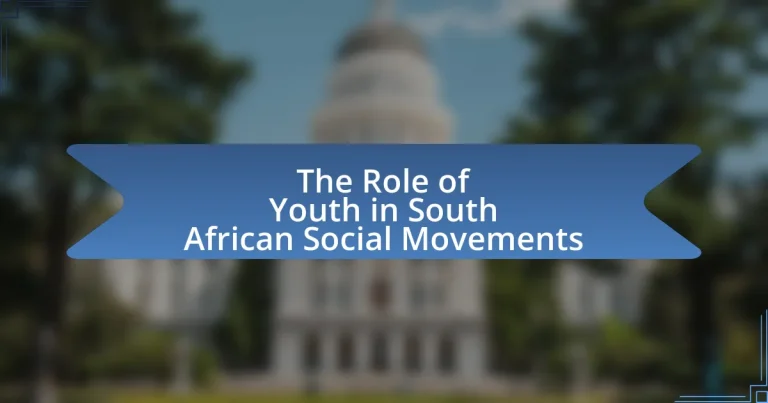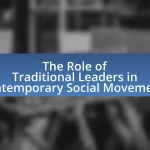The article examines the critical role of youth in South African social movements, highlighting their historical and contemporary contributions to activism. It discusses significant events, such as the anti-apartheid struggle and recent movements like #FeesMustFall and #RhodesMustFall, illustrating how youth mobilize for social change through protests and digital platforms. The article also addresses the challenges faced by young activists, including socio-economic barriers and limited political representation, while emphasizing the importance of their unique perspectives and innovative strategies in driving social justice and policy reforms. Additionally, it explores the future of youth involvement in activism and the resources available to support their efforts.
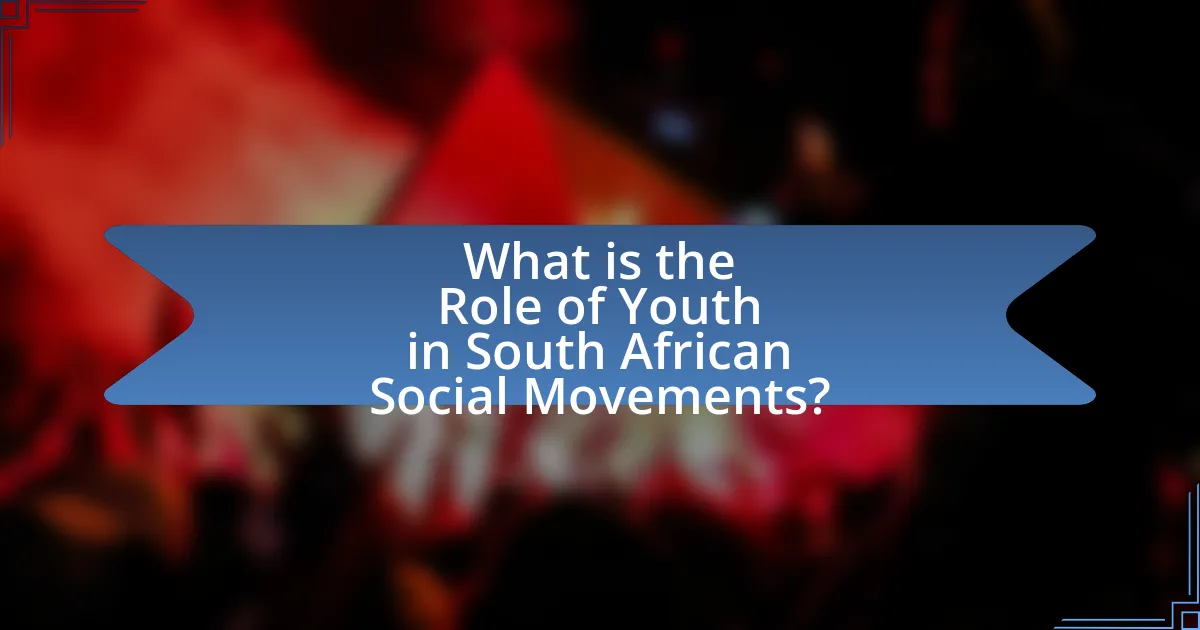
What is the Role of Youth in South African Social Movements?
The role of youth in South African social movements is pivotal, as they often serve as catalysts for change and mobilization. Historically, young people have been at the forefront of significant movements, such as the anti-apartheid struggle, where student protests, notably the Soweto Uprising in 1976, highlighted their capacity to challenge oppressive systems. In contemporary contexts, youth engage in various social issues, including education, unemployment, and climate change, utilizing platforms like social media to organize and advocate for their rights. Their involvement is crucial for fostering democratic participation and ensuring that the voices of younger generations are heard in shaping national policies and social justice initiatives.
How have historical events shaped the involvement of youth in these movements?
Historical events have significantly shaped the involvement of youth in South African social movements by providing a context for activism and mobilization. For instance, the anti-apartheid struggle in the 1980s saw youth actively participating in protests and demonstrations, driven by the oppressive policies of the apartheid regime. The Soweto Uprising of 1976, where students protested against the imposition of Afrikaans as the medium of instruction, exemplifies this involvement; it resulted in a heightened political consciousness among young people and galvanized further activism. Additionally, the end of apartheid in 1994 opened new avenues for youth engagement in democratic processes, leading to their participation in political parties and civil society organizations. These historical milestones illustrate how youth have been influenced by the socio-political landscape, prompting them to take action in pursuit of social justice and equality.
What key social movements have seen significant youth participation?
Key social movements that have seen significant youth participation in South Africa include the anti-apartheid movement, the Fees Must Fall movement, and the #RhodesMustFall campaign. The anti-apartheid movement, particularly during the 1980s, mobilized thousands of young people who played crucial roles in protests and activism against racial segregation. The Fees Must Fall movement, which began in 2015, saw university students advocating for free education, highlighting the financial burdens on youth. Similarly, the #RhodesMustFall campaign, initiated in 2015, focused on decolonizing education and removing colonial symbols from institutions, engaging a large number of young activists. These movements demonstrate the critical role of youth in shaping social and political discourse in South Africa.
How did apartheid influence youth activism in South Africa?
Apartheid significantly influenced youth activism in South Africa by mobilizing young people against systemic racial oppression. The oppressive policies of apartheid, which enforced racial segregation and denied basic rights to non-white populations, galvanized youth to organize protests, such as the 1976 Soweto Uprising, where thousands of students protested against the imposition of Afrikaans as the medium of instruction in schools. This uprising resulted in a violent crackdown by the police, leading to the deaths of many students, which further fueled national and international outrage and solidarity. The activism of youth during this period laid the groundwork for future movements and highlighted the critical role of young people in the struggle for democracy and equality in South Africa.
Why is youth participation crucial in social movements?
Youth participation is crucial in social movements because it brings energy, innovation, and a fresh perspective that can drive change. Young people often possess a strong sense of justice and are more willing to challenge the status quo, as evidenced by their significant roles in movements like the anti-apartheid struggle in South Africa, where youth activism was pivotal in mobilizing communities and influencing policy changes. Furthermore, research indicates that youth engagement in social movements leads to higher levels of activism and advocacy, as seen in the 2015 #FeesMustFall movement, which highlighted the importance of accessible education and garnered widespread support from students across the nation. This active involvement not only empowers youth but also ensures that their voices and concerns are represented in the broader societal discourse.
What unique perspectives do young people bring to social movements?
Young people bring innovative ideas and a fresh approach to social movements, often challenging traditional norms and advocating for change through digital platforms. Their unique perspectives are shaped by their experiences with social media, which allows for rapid information dissemination and mobilization, as seen in movements like #FeesMustFall in South Africa, where students utilized online tools to organize protests and raise awareness about educational inequalities. Additionally, young people often prioritize issues such as climate change, gender equality, and social justice, reflecting a broader global consciousness that influences local movements. This generational focus on intersectionality and inclusivity has been pivotal in reshaping agendas and strategies within social movements, making them more relevant to contemporary societal challenges.
How does youth involvement impact the effectiveness of social movements?
Youth involvement significantly enhances the effectiveness of social movements by bringing energy, innovation, and a fresh perspective to activism. Young people often leverage social media and digital platforms to mobilize support quickly, as seen in the #FeesMustFall movement in South Africa, which effectively organized protests against rising university fees, attracting thousands of participants and gaining national attention. Furthermore, research indicates that youth engagement leads to higher levels of participation and advocacy, as demonstrated by the 2019 South African Youth Climate Strike, where young activists successfully influenced policy discussions on climate change. This active participation not only amplifies the voices of marginalized groups but also fosters intergenerational solidarity, making social movements more resilient and impactful.
What challenges do youth face in participating in social movements?
Youth face several challenges in participating in social movements, including limited access to resources, lack of political representation, and societal pressures. Limited access to resources, such as funding and organizational support, hinders their ability to mobilize effectively. Additionally, youth often lack political representation, which can lead to their voices being marginalized in decision-making processes. Societal pressures, including stigma and the fear of backlash from authority figures, can further discourage youth from engaging in activism. These challenges are evident in various South African social movements, where young activists have reported feeling sidelined despite their enthusiasm and commitment to social change.
What barriers limit youth engagement in activism?
Barriers that limit youth engagement in activism include lack of access to resources, limited awareness of social issues, and societal pressures. Many young individuals face financial constraints that hinder their ability to participate in activism, as they may lack funds for transportation or materials needed for campaigns. Additionally, a significant number of youths are unaware of pressing social issues due to insufficient education or exposure, which diminishes their motivation to engage. Societal pressures, such as family expectations or fear of backlash, further discourage youth from participating in activism. Research by the South African Institute of Race Relations indicates that these factors collectively contribute to a lower rate of youth involvement in social movements.
How do socio-economic factors affect youth participation?
Socio-economic factors significantly influence youth participation by shaping their access to resources, opportunities, and social networks. For instance, youth from lower socio-economic backgrounds often face barriers such as limited access to education, employment opportunities, and financial resources, which can hinder their ability to engage in social movements. Research indicates that in South Africa, youth unemployment rates are disproportionately high, reaching over 60% among those aged 15-24, which directly impacts their capacity to participate in civic activities. Additionally, socio-economic status affects social capital; youth with stronger networks and support systems are more likely to engage in activism and community organizing. Thus, the interplay of economic conditions and social structures plays a crucial role in determining the level of youth involvement in social movements.
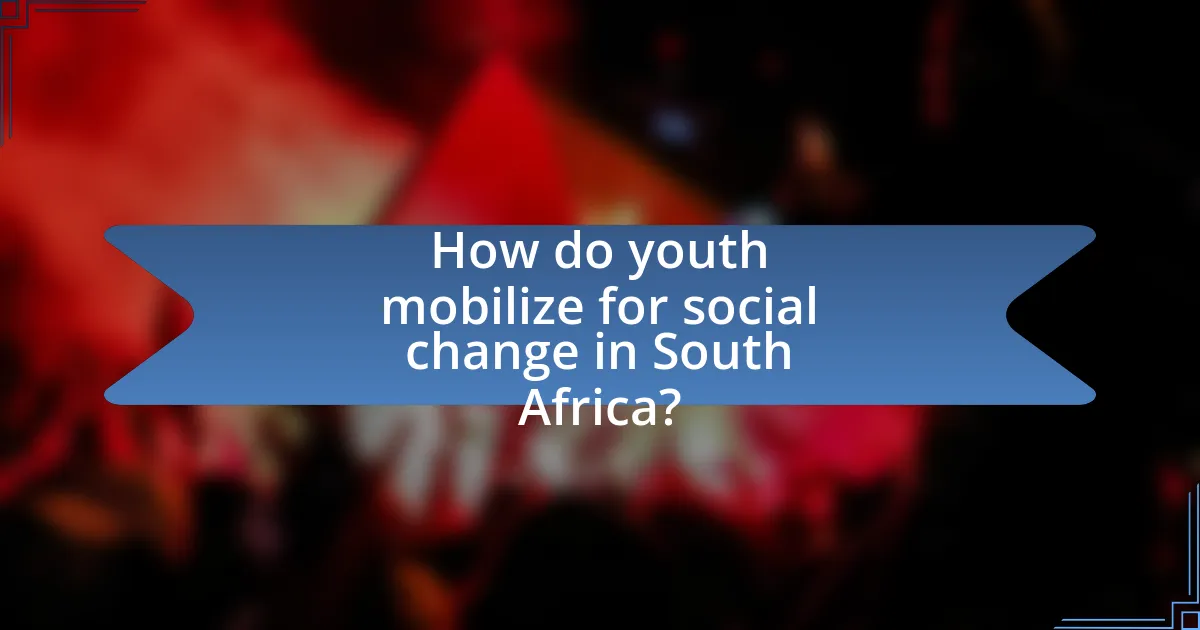
How do youth mobilize for social change in South Africa?
Youth in South Africa mobilize for social change through organized protests, social media campaigns, and community engagement initiatives. These methods allow young people to raise awareness about issues such as inequality, education, and unemployment. For instance, the #FeesMustFall movement, which began in 2015, saw students protesting against rising university fees, leading to significant policy changes in higher education funding. Additionally, platforms like Twitter and Facebook have been instrumental in spreading messages quickly and rallying support, as evidenced by the rapid mobilization of youth during the 2019 national elections, where they advocated for issues affecting their communities.
What strategies do young activists use to organize movements?
Young activists in South Africa utilize various strategies to organize movements, including leveraging social media, grassroots mobilization, and coalition-building. Social media platforms like Twitter and Facebook enable them to disseminate information rapidly, engage with a broader audience, and coordinate events effectively. For instance, the #FeesMustFall movement, which protested against rising university fees, gained significant traction through social media campaigns that mobilized thousands of students across campuses. Grassroots mobilization involves organizing local community meetings and protests to raise awareness and encourage participation, as seen in the work of organizations like the South African Students’ Congress. Additionally, coalition-building with other activist groups enhances their reach and impact, allowing for a united front on issues such as climate change and education reform. These strategies demonstrate the effectiveness of young activists in driving social change in South Africa.
How has social media influenced youth mobilization efforts?
Social media has significantly influenced youth mobilization efforts by providing a platform for rapid communication and organization. This digital space allows young people to share information, coordinate activities, and rally support for social causes efficiently. For instance, during the #FeesMustFall movement in South Africa, social media was instrumental in mobilizing thousands of students to protest against rising tuition fees, demonstrating its effectiveness in uniting youth around a common goal. Research by the University of Cape Town highlighted that 80% of participants in the movement utilized social media to disseminate information and organize events, showcasing the critical role these platforms play in contemporary youth activism.
What role do educational institutions play in fostering activism among youth?
Educational institutions play a crucial role in fostering activism among youth by providing a platform for critical thinking, civic engagement, and social awareness. These institutions often incorporate curricula that emphasize social justice, human rights, and community service, which encourages students to engage with societal issues. For instance, universities in South Africa have historically been centers for political activism, as seen during the Fees Must Fall movement, where students mobilized against rising tuition fees, demonstrating the power of educational settings in shaping activist identities. Furthermore, educational institutions often facilitate student organizations and clubs that focus on activism, allowing youth to collaborate, organize, and amplify their voices on pressing social issues.
What are the outcomes of youth-led social movements?
Youth-led social movements often result in significant social change, increased political awareness, and the mobilization of communities. These movements have historically influenced policy reforms, such as the anti-apartheid movement in South Africa, where youth played a crucial role in advocating for equality and justice. For instance, the Soweto Uprising in 1976, led by students protesting against the imposition of Afrikaans in schools, highlighted the power of youth activism in challenging oppressive systems and ultimately contributed to the end of apartheid. Additionally, youth-led movements frequently foster a sense of agency among young people, encouraging them to engage in civic activities and pursue leadership roles in their communities.
How have youth movements contributed to policy changes in South Africa?
Youth movements in South Africa have significantly influenced policy changes by mobilizing public opinion and advocating for social justice. For instance, the #FeesMustFall movement, which began in 2015, successfully pressured the government to freeze tuition fees at public universities, demonstrating the power of organized youth activism. Additionally, the youth-led protests against gender-based violence have led to increased governmental focus on legislative reforms, including the establishment of the National Strategic Plan on Gender-Based Violence and Femicide in 2020. These movements exemplify how collective youth action can drive policy shifts and address pressing societal issues in South Africa.
What successes have youth activists achieved in recent years?
Youth activists in South Africa have achieved significant successes in recent years, notably in the areas of climate action, education reform, and social justice. For instance, the #FeesMustFall movement, which began in 2015, successfully pressured the government to implement a zero percent fee increase for university tuition in 2016, demonstrating the power of youth-led advocacy in higher education policy. Additionally, youth activists have played a crucial role in the national climate strikes, mobilizing thousands to demand government accountability on environmental issues, which has led to increased public discourse and policy considerations regarding climate change. These achievements highlight the effectiveness of youth activism in influencing social and political change in South Africa.
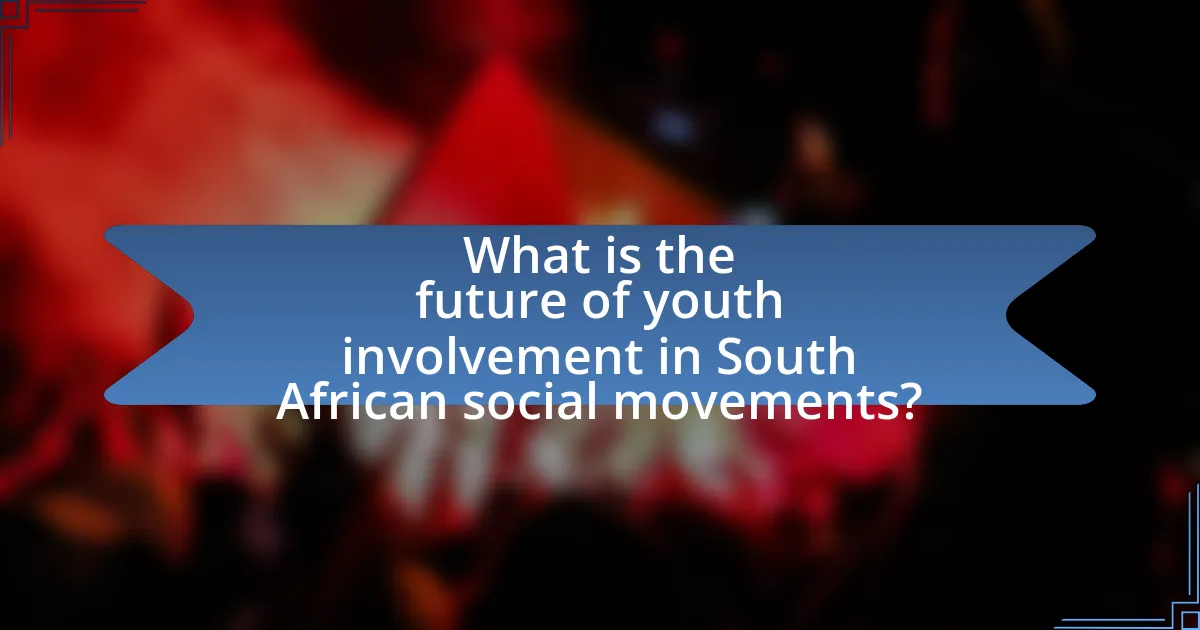
What is the future of youth involvement in South African social movements?
The future of youth involvement in South African social movements is likely to be characterized by increased digital engagement and activism. Young people are increasingly utilizing social media platforms to mobilize, organize, and advocate for social change, as evidenced by movements like #FeesMustFall and #BlackLivesMatter, which gained significant traction online. According to a 2021 study by the Institute for Justice and Reconciliation, 70% of South African youth believe that social media is an effective tool for activism. This trend indicates that youth will continue to play a pivotal role in shaping social movements, leveraging technology to amplify their voices and influence policy changes.
How can youth continue to influence social change moving forward?
Youth can continue to influence social change moving forward by leveraging technology and social media to mobilize and advocate for issues that matter to them. For instance, the #FeesMustFall movement in South Africa demonstrated how young people effectively used social media platforms to organize protests and raise awareness about educational funding. This approach not only amplified their voices but also attracted national and international attention, leading to policy discussions. Furthermore, youth can engage in community organizing and grassroots initiatives, as seen in various local campaigns addressing social justice, environmental issues, and economic inequality. By participating in democratic processes, such as voting and advocacy, young people can shape policies that reflect their values and priorities, ensuring their influence on social change remains significant.
What skills and knowledge do young activists need to develop?
Young activists need to develop skills in communication, organization, and critical thinking, along with knowledge of social justice issues and advocacy strategies. Effective communication skills enable activists to articulate their messages clearly and engage diverse audiences, while organizational skills help in planning and executing campaigns efficiently. Critical thinking allows them to analyze complex social issues and develop informed solutions. Knowledge of social justice issues, such as inequality and human rights, is essential for understanding the context of their activism, and familiarity with advocacy strategies equips them to influence policy and mobilize support. These competencies are vital for driving impactful social change in South African movements.
How can intergenerational collaboration enhance youth activism?
Intergenerational collaboration enhances youth activism by combining the energy and innovative ideas of youth with the experience and wisdom of older generations. This partnership fosters a more comprehensive understanding of social issues, as older activists can provide historical context and strategic insights that inform youth-led initiatives. For instance, the collaboration seen in South Africa’s anti-apartheid movement demonstrated how youth activism was strengthened by the mentorship of seasoned leaders, leading to more effective mobilization and advocacy efforts. Such collaborations can also amplify voices, as diverse perspectives create a more inclusive movement, ultimately driving greater societal change.
What practical steps can youth take to engage in social movements?
Youth can engage in social movements by participating in community organizing, advocating for policy changes, and utilizing social media platforms for awareness. Community organizing involves joining local groups that focus on specific issues, allowing youth to collaborate with others and mobilize resources effectively. Advocating for policy changes can include attending town hall meetings, writing to local representatives, or participating in campaigns that align with their values. Utilizing social media platforms enables youth to spread awareness, share information, and connect with like-minded individuals, amplifying their voices and causes. These actions have been shown to increase civic engagement and influence public opinion, as evidenced by the significant role youth played in movements like the Fees Must Fall campaign in South Africa, which successfully challenged tuition increases and highlighted educational inequalities.
What resources are available for young activists in South Africa?
Young activists in South Africa have access to various resources, including organizations, funding opportunities, and training programs. Notable organizations such as the South African Youth Council and the African Youth Union provide platforms for networking, advocacy, and capacity building. Additionally, funding opportunities from entities like the National Youth Development Agency support youth-led initiatives. Training programs offered by institutions like the University of Cape Town and various NGOs equip young activists with skills in leadership, advocacy, and social justice. These resources collectively empower youth to engage effectively in social movements and contribute to societal change.
How can youth effectively advocate for their causes in their communities?
Youth can effectively advocate for their causes in their communities by organizing grassroots campaigns that raise awareness and mobilize support. These campaigns can include community meetings, social media outreach, and collaboration with local organizations to amplify their message. For instance, the #FeesMustFall movement in South Africa demonstrated how youth mobilized through social media and protests to advocate for affordable education, resulting in significant policy discussions and changes. Engaging in dialogue with local leaders and participating in community forums also enhances their visibility and influence, allowing them to present their concerns and solutions directly to decision-makers.
